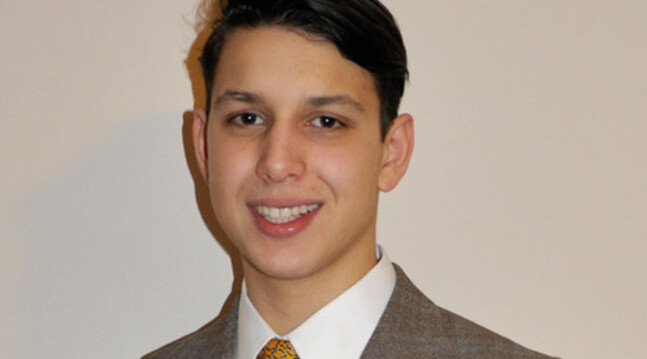Amulya Kandikonda is 16 years old and a junior at Carmel Catholic High School, Mundelein, Illinois. “I find it fascinating to immerse myself into the life of a person completely different from me. Whether I'm strolling down the streets of Chicago, listening to a Shaman in Oahu, or simply discussing Shakespeare in class, I am encompassed in an effort to broaden my horizons.”
Essay Topic: What Does Moral Leadership Mean to You?
Moral Leaders: The Beacons of Hope
Every afternoon, I make a journey from my AP Microeconomics class to my Social Justice class. Although this is a casual transition for me, some of my friends see the shift as walking from the Sahara to the South Pole. Why do my friends see such a distinction between the two areas of study? Is there one subject more important than another? Is money more important than morals?
I thought my answers could be found by exploring how people chose and supported leaders. After all, shouldn't the faces we see on the news represent our society? I looked to the media to show me what society feels is important in a leader.
Unfortunately, this created a blend of confusion for me. Democrats and Republicans, Liberals and Conservatives, Blacks and Whites, Atheists and Christians—the United States is a nation of categories. As I watch the news, read a magazine, or listen to the radio, I am continuously reminded of these budding groups. It seems like individuals just side with political, social, business, and religious leaders based on what group or category they belong to.
Morality? I can't recall a single instance where an individual's morality was being discussed in the dozens of articles I read, news stories I watched, and interviews I heard during my research.
I actually took a class on Morality last year where I investigated the definition of morality and what makes an act moral or immoral. Morality, as defined by my textbook, is the goodness or sinfulness of an act. But isn't morality more than just being able to decide what is right and wrong? As I learned throughout the class, truly moral people are able to flex their "moral muscle" and do beyond minimum justice to extend their goodness to all human beings. A morally strong person does what is right, even if it may not be the social norm.
The denotation of a leader is simply one whom other people follow. Then why are there so few leaders in our world? Why do we follow, and even glorify, some individuals but not others? Why can't just anybody become a president or prime minister? Leaders must have an element of distinctiveness. There must be something that separates them from the followers. We can all agree that leadership is a unique trait, but more importantly…what makes moral leadership so unique? The answers may actually lie in scientific research.
On the first day of Morality class, we learned that humans are born "good" and morally knowledgeable. Besides the beliefs of Religious Doctrine, this subject was explored in psychology as well. The Yale University "Baby Study" researched if humans were born with moral knowledge and an attraction to what is "good." 6-month old babies were shown puppet shows where one puppet was the "good" puppet that didn't steal and always gave its toys, whereas another puppet was the "bad" puppet that always stole toys and refused to share. The babies almost unanimously reached for the "good" puppet over the bad puppet when given the choice of both puppets. This study failed to answer all of my questions concerning moral leadership. If the study's conclusion is true, and individuals are born with a moral conscience, then why do immoral leaders come into power? Why do individuals follow leaders who conduct injustices like genocide and slavery?
I explored this question while learning about a famous experiment by psychologist Stanley Milgram in my History class. Milgram's experiment on obedience to authority figures studies if individuals are willing to even kill a stranger if an authority figure commands them to do so. A scientist meets two research subjects (one of whom is an actor who is in on the experiment). The research subjects informally exchange greetings before the experiment, but do not personally know each other. One subject is assigned the "student" role (the actor) and one is assigned the "teacher" role (the actual research subject). The student sits in a room strapped to an electric chair and the teacher sits in a room with a machine that controls the shock voltages of the electric chair. The test subjects are explained by the scientist that at 400 volts of shock, an individual is in danger of death. The "teacher" reads out questions to the speaker and the "student" responds to the questions. With every wrong answer the teacher increases the voltage level of electric shock to the student. Of course, the actor or student releases himself from the electric chair before the experiment is conducted. The research subject conducts the whole experiment with the knowledge that their actions could potentially kill a human being. Some research subjects questions the authoritative scientist when reaching the 400 volt mark, but most research subjects continue the experiment with no rebellion. Results showed that over 60 percent of test subjects administered 400 volts of fatal shock to another human being. Why would somebody kill an absolute stranger? Test subjects explained that they did not want to disobey the orders of the scientist, and believed that their actions were for the benefit of scientific research.
What do Milgram's experiment and the baby study have to do with Moral leadership? Individuals are obedient to authority figures (in Milgram's case a scientist) and are willing to even do something morally wrong, like kill an individual, if they are told to do so. People may be internally morally knowledgeable from birth, but because of an influence of an immoral figure of authority, people may cheat, steal, and even kill. Adolf Hitler, Pol Plot, and Joseph Stalin did not complete their agendas on their own. They were able to do their immoral deeds, such as genocide and economic suppression, with the help of followers. After all, what is a leader without followers?
Moral leadership is crucial to the world for this reason. Moral leaders are not just beneficial to the world, but necessary. Individuals like Mahatma Gandhi and Nelson Mandela were able to build a more ethical and just world not only for their people, but generations of people to come. Leaders don't just lead, they create a different world. Moral leaders go further and not only create a different world, but a better world.
Why does my transition from Economics to Social Justice have to be so dramatic? Why can't economics and social justice have similar creeds? In my future, I hope I can see a world in which they can. The society that we should strive for should exhibit moral behavior in all fields and in all groups of people. Businessmen, politicians, doctors, lawyers, and teachers alike should all make ethical decisions. Morality is universal—not just a trait limited to a group of individuals, but because leaders are especially responsible for the well-being of society, they must make moral decisions to protect the interests of all people. A businessman like Andrew Carnegie, a president like Abraham Lincoln, and even a student like Malala Yousefzai all had the capacity to make moral decisions alike.
I have been fortunate enough to witness moral leadership in action through my work with the Desire Society, a non-governmental organization that benefits children with HIV. Desire has several care homes all through India that specially help orphaned children with HIV. India ranks second in the world for number of AIDS diagnoses, and due to the amount of stigma associated with the disease individuals are unwilling to help AIDS patients. The founders and volunteers of the Desire Society stray from this generalization. I had a chance to meet with some of these individuals while working as a teacher with the Desire society. I especially bonded with Dr. Neelima Mohanty, who although is educated in medicine, spends her time as a volunteer for Desire. Dr. Mohanty explained to me how so many people discouraged her from working with Desire because of the fears associated with AIDS. Mohanty decided to break through barriers that her peers set up for her and strive to do what she believed was right. She believed that all children deserve love and care—regardless of race, religion, gender, or even health. She not only conducts her service without capital gain, but also while facing the public criticism. Mohanty is a moral leader because she is ready to defy social norms in order to do what is right.
Moral leadership is a necessity to our world. It has been exhibited in previous generations and continues to be exhibited today. As responsible citizens, we have the duty to promote the importance of moral leadership and its importance in society. It is time for us to create a future where all individuals—including scientists, entrepreneurs, politicians, and even students—make moral decisions for a better tomorrow. In the rough waters of this world, where ethics and morals are often left to sink, we must all join to become moral leaders and beacons of hope.




